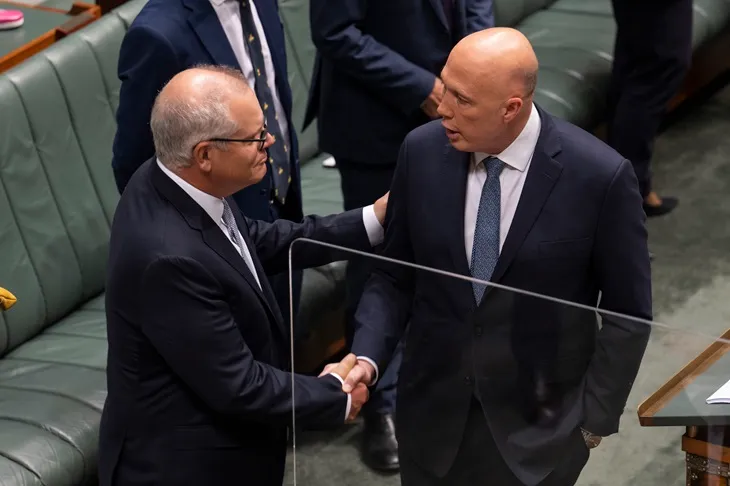The following was published in the Spectator Australia on the 25th of January 2024. You can see the article on their website here.
The political landscape is set to undergo another significant shift with the announcement of former Prime Minister Scott Morrison’s departure from politics.
As Morrison, a key figure in recent political history, prepares to exit the parliamentary stage, his move underscores a long period of transition and upheaval. This comes at a time when the Labor government, led by Prime Minister Anthony Albanese, faces its own critical moment of reckoning, as highlighted in yesterday’s hastily arranged snap caucus meeting. Morrison’s departure, juxtaposed against the backdrop of Labor’s current challenges, marks a pivotal moment in Australian politics, reflecting a time of change, uncertainty, and the need for decisive leadership.
The hastily convened caucus meeting, summoned by the Prime Minister, is an unmistakable indicator of a government scrambling in the face of escalating challenges. This urgent gathering, seemingly called in desperation to change the subject of the national conversation, casts a spotlight on the Labor government’s pattern of delayed responses, broken promises, and questionable leadership.
For more than a year, Australian families have been bearing the brunt of rising living costs and unyielding inflation. Despite these long-standing challenges, the government’s sense of urgency is only now coming to the fore. Why has it taken so long for the government to react? Leadership is measured by foresight and timely action, not by belated responses to crises that have been evident for months. This appears to be a government that hoped that these problems would solve themselves which raises doubts about the government’s competency.
The financial implications of this snap caucus meeting are also a cause for concern. With the potential cost to taxpayers reaching $500,000, one must scrutinise the government’s priorities. This expenditure, for a meeting that could have easily been held when Parliament resumes in February, underlines the misplaced priorities. The question looms large: Why was such fiscal commitment and rapid government action absent when Australians first started to reel under the economic pressure?
More troubling, perhaps, is the surfacing of deep divisions within the Labor Party itself, especially concerning the legislated Stage Three tax cuts. This discord is not merely a matter of differing opinions; it is a symptom of a party seemingly at war with itself because there isn’t a clear agenda the government is pursuing. When a government cannot align on its policies and priorities, it casts doubt on its capacity to govern effectively. How can the people of Australia place their trust in a government that appears so fractured in its vision and direction?
Prime Minister Albanese’s decision to call this ‘emergency’ meeting places his leadership under intense scrutiny. Effective leadership involves anticipating and addressing issues promptly before they balloon into larger problems. This reactive approach to critical national issues raises serious questions about his ability to lead both the nation and his party. Is the Prime Minister guiding the Labor Party’s path, or is he being steered by its internal chaos?
As Australians, we deserve a government that anticipates and tackles challenges, not one that reacts long after the fact. Labor’s style of government, characterised by last-minute tactics and internal conflict, falls short of the decisive, strong leadership our country needs in these challenging times.
As we witness this unfolding, it becomes increasingly evident that Australia needs a change. We need a government that not only understands our challenges but also has the capacity and unity to address them proactively.
Blake Keating is a member of the NSW Liberal Party State Executive and is a former President of the Australian Liberal Students’ Federation.

